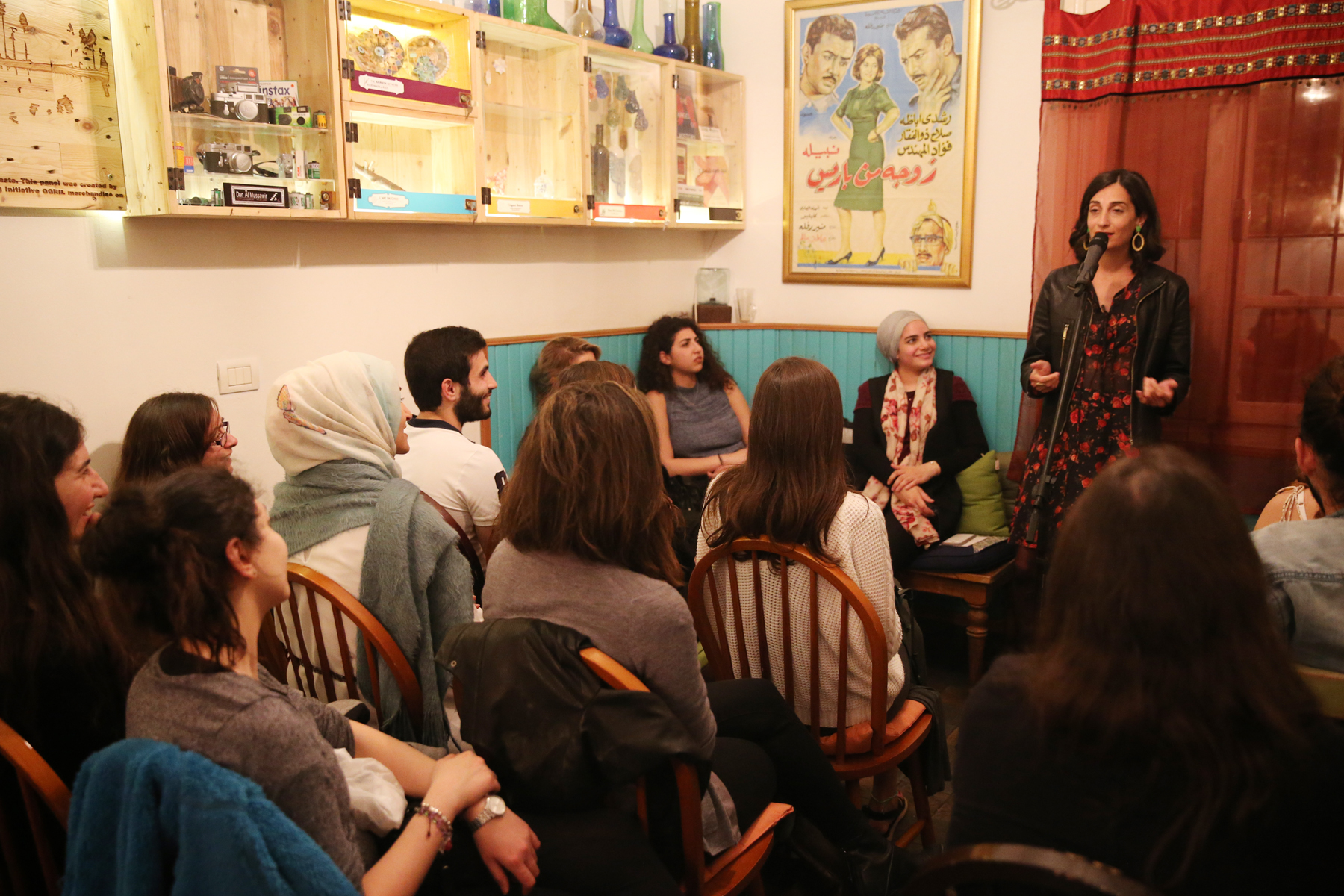
In Arab world, an ancient tradition of oral storytelling gets a 21st Century spin
In the past, “hakawati” would recount legends or fables; today, Moth-like events often tackle social issues or process trauma from war.
Thirteen-year-old Simav Wooleh took the stage with a disarming smile in front of the audience gathered in a Beirut café. If she was nervous, the only thing that betrayed her was a tendency to fidget with her hands.
“Good evening,” Simav began in English, then switched to Arabic. “Now I want to tell a story about when my dad’s life was threatened in Syria.”
“Once upon a time, it was a sunny day, like usual, five years ago in Aleppo…”
“The most compelling things I know and learned didn’t make it into a news story. News stories just don’t portray the charm and the pain and the humanity enough.”
Simav was taking part in a new wave of oral storytelling in Beirut and elsewhere in the Middle East in recent years that has reimagined an ancient tradition in the region in a 21st century context.
Some of the new events follow a similar format to The Moth, the popular American event and podcast that features live storytellers. But they also build on the legacy of the hakawati, or storyteller, who was long a treasured source of entertainment — and sometimes the only one available.
In the old days, the traditional hakawati would recount legends, fables or stories from the Quran; the new storytelling tradition is often more personal.
Some of the stories are humorous – like a joint mother-son account of one young man’s attempt to run away from home at age 14 and pursue a life of poetry. Others are heartbreaking, like the woman who broke down in tears describing how her favorite son had been killed amid fighting between rival neighborhoods in the city of Tripoli in northern Lebanon.
Often, the events serve as public forum to discuss social issues or process trauma from war and other forms of violence.
On the night when Wooleh performed her piece, the event centered on the stories of a group of Syrian refugee youths living in Lebanon, alongside a group of ex-combatants from Lebanon’s civil war. It was part of the Hakaya storytelling series that a group of friends launched here last year.
Rima Abushakra, one of the founders of the group, is a former journalist and co-owner of Dar Café, a restaurant popular with journalists and bohemians in Beirut’s Hamra neighborhood that serves as the forum for the monthly storytelling events.
Abushakra said her interest in storytelling events was spurred, in part, by the stories she wasn’t able to tell as a reporter.
“The most compelling things I know and learned didn’t make it into a news story,” she said. “News stories just don’t portray the charm and the pain and the humanity enough.”
“People want to be heard, and when you give them a platform, they’re just so amazed that people are willing to listen, especially when their voices are so neglected.”
Dima Matta, a professor, writer and actress, launched the trend of storytelling gatherings in Beirut in 2014 with her Cliffhangers storytelling event. Matta, who grew up listening to her father’s stories of the Lebanese civil war and his youth in his family’s village during many of Beirut’s frequent power cuts, said she sees the new storytelling events as a continuation of the Middle Eastern hakawati tradition, but also as a way of documenting personal histories that would otherwise go untold.
“Now it’s a new chapter where people’s personal stories are given center stage,” she said. “…People want to be heard, and when you give them a platform, they’re just so amazed that people are willing to listen, especially when their voices are so neglected.”
Like the Hakaya group, Matta sometimes deliberately takes on social issues in her events. Most recently, she put on an evening of coming-out stories put on as part of Beirut Pride week, with speakers including Hamed Sinno, frontman of the popular Lebanese indie rock band Mashrou Leila. At another event, she brought residents of a senior home for Palestinian refugees to share their memories.
“For me, storytelling is definitely a form of activism,” Matta said.
The storytelling events, and their willingness to deal with social issues, are growing more popular elsewhere in the region. In Egypt, for instance, a storytelling group called the BuSSy Project holds workshops and events that bring gender issues to center stage, giving a platform to women and men to talk about sexual harassment, domestic violence and other social problems.
Abushakra said it was natural that social issues would become part of the new storytelling tradition.
“They’re realities we face and adapt to and sometimes change,” she said. “It’s hard to escape them, but also we don’t seek to escape them – it’s more to address them in a personal way.”
Back in the café, Simav launched her story with an account of mundane details: her family getting dressed to go to the market, Wooleh nagging her mother to buy some clothes she spotted in a shop window that were “yani, bijennan” – “like, amazing” – her mother giving in.
The tale quickly turned as the family arrived at a vegetable stand to buy some lettuce to make a salad:
“When we were buying the salad, the lettuce, suddenly a sniper from above the building shot at my dad. But my dad went like this [bending forward], went to take the bag, so [the bullet] went behind him and didn’t hit him.”
Another bystander was less fortunate.
“There was a guy there who was putting things in a car. It hit the guy in the head and the guy died – fell down and died.”
But the point of the story was not simply to recount a traumatic moment. In traditional style, the tale ended with a moral.
In the ensuing panic, Simav said, her father ran off with the head of lettuce without paying. The next day, the family returned to settle the bill.
When Simav asked why they had gone back, she said, her mother told her, “Because in the afterlife there is no money to pay the guy.”
“So from that time, I promised that I won’t take money from anyone and not return it, because in the afterlife, as my mom said, there is no money to pay him,” Simav concluded, with another broad smile. “And this is my story.”
Written by Abby Sewell
Image: Niemanstory Board
Publication date: June 6, 2017
Learn about about MENA NGOs involved in culture
MENA’s first free click-to-donate platform – you click, we donate





Copyright © 2024 The Olive Tree SAL, all rights reserved. Terms of Use | Privacy Policy